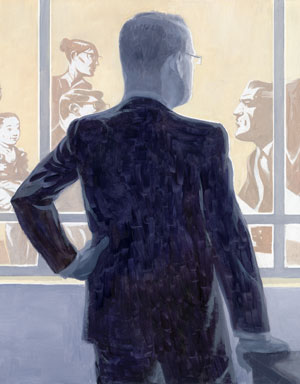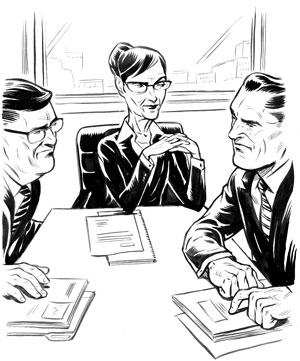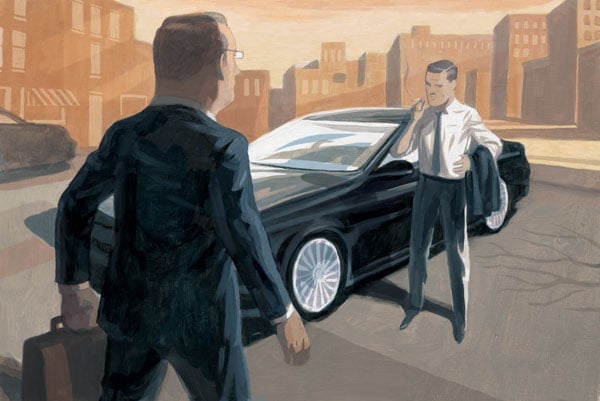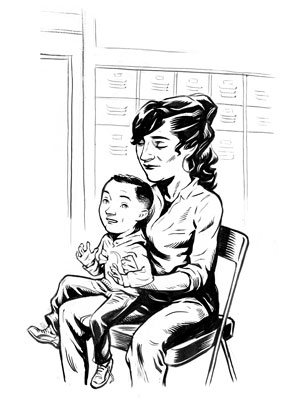Sealed Windows

Art by Lars Leetaru
The prize was awarded in conjunction with the annual Harper Lee Prize for Legal Fiction, which is also sponsored by the ABA Journal, along with the University of Alabama School of Law. This year’s Harper Lee winner was The Secret of Magic by Deborah Johnson.
Sealed Windows
A Short Story by Andy Greensfelder
“Here comes the lawyer,” cried out a woman as Peter Marshall entered the courtyard at St. Vincent de Paul Cathedral, where he volunteered every other Friday. The cathedral had become more mission than church. The archbishop had moved the power and pomp to the suburbs, leaving behind the food pantry and social services. Peter wove through the crowd, mostly women, huddled together for warmth, waiting for the November sun to clear the steeple. “We’re in trouble now,” one said, and the others laughed.
“I’m ready for you, Ginger,” he said. He wondered how people so short on food and long on challenges could be so cheerful, while he was on edge after an angry phone call from his largest client. He had put the client off until noon so he could come to the church, but he’d have to push things to make that appointment.
Inside he wound down the basement stairs to the ancient gym and through the people waiting their turn for groceries. Meola Martinez, who ran the operation, announced: “Anyone needs help with the bill collector, landlord, stuff like that—sign up for the lawyer.” Her Spanish lilt wafted over the hubbub.
He eased past a mother nursing her baby, toward a row of tables with sign-up sheets for food, clothing, blankets, a winter-heat program and legal aid. He snatched the list of would-be clients and angled toward his office in the girls’ locker room. At the free-throw line, Meola intercepted him, her arms held wide.
“Mmmmmmm, this lawyer knows how to hug,” she said.
“You’re good with the help, Meola. Maybe you’d come downtown and manage our firm.”
“A big-bucks law firm’s not for me. I need your help, though.” She grabbed his arm and guided him to his desk. “Here.” She thrust an envelope into his hand. “Please take a look and tell me if there’s anything I can do.”
“Come in when you can,” he said. “Don’t wait too long. I’m tight on time.”
In the makeshift office, he straightened the chairs and drew a legal pad from his briefcase before returning to the gym for his first client. For the next couple hours he scribbled tales of past-due debts, black-and-blue marriages and evicted families. A woman named Harriet sobbed and moaned. “The sheriff put us out—my children, the baby, all our furniture.”
“Terrible. Where are they now?” he said.
“My husband stayed with the children. A policeman was already telling them to move on; he was calling a truck to haul away our stuff.”
Peter boiled. The same landlord probably complained at the station about the homeless. He pulled the classifieds from the morning paper in his briefcase and found an inexpensive apartment—God knows what it was like—and referred Harriet, still sobbing, to Meola for an emergency grant from a fund he had persuaded the local bar association to bankroll.
He worked his cases quickly and at 11:15 finished his last intake to send to the Legal Aid office. As he packed his briefcase, Meola walked in, her arm around a little boy.
“Who’s your friend?” Peter said as he reached for the envelope Meola had handed him earlier, which he’d forgotten.
“Andre’s my son, supposedly too sick for Head Start.”
“Hi, Andre.” Peter offered a hand to the boy. To Meola he added, “I’m running late. I’ll take a look and give you a call on Monday or over the weekend.” He hoisted the briefcase and stuck his pen into his pocket.
“The bank … it’s taking my house.”
“That’s terrible,” he said, one foot toward the door. “I’ll give you a call this afternoon.”
“This afternoon won’t do.” Her voice dipped, rose and tugged. So did his irritation.
“I have no choice,” he said. He pictured Herb Milton, irate, pacing his office, picking another attorney to replace him.
“I ask you, mister lawyer. Why bother coming if you can’t help people?” She stood with her hands on her hips, her face indignant.
Peter’s face grew hot. Friday mornings at the office instead of here would pump some relief into his miserable schedule, allow him to put his paying clients first, avoid Fridays like today when he had agreed to meet the managing partner of his firm after 5 because no other time was available. He was on the verge of saying, “Find another volunteer.”
Meola murmured “please.” He froze, unable to leave, unwilling to stay. One-handed, without setting down his briefcase, he fumbled the papers out of the envelope. On top was a wrinkled deed and a mortgage for 2824 Braden St., not far from where his mother had grown up. Most of the rest—why did people keep all this junk?—were meaningless documents until he came to: “Notice of foreclosure. To all interested parties …” It was succinct: On Dec. 11, three weeks from Monday, River Bank would sell Meola Martinez’s home on the courthouse steps if she failed to pay $17,498.27.
“Why’s the largest bank in the state foreclosing on the house you’ve been in … my God, you’ve been there almost 20 years.” A sour taste sat in his mouth. “What’s going on?”
“I’ve paid every month on time, but they say the loan’s due.”
Peter had a conflict of interest. His firm did not represent River Bank, but it represented business interests. The bank could undermine the firm’s position in the business community and with mutual clients.
He’d jumped into worse conflicts and made them work. There might be ways to help Meola without be-coming adversarial. He’d have to be careful, yet the danger excited him. He lowered his briefcase, slipped off his jacket, sat down and pointed to a chair for Meola. She held Andre on her lap, restraining his hands as he reached for Peter’s pen on the desk.
“They can’t foreclose if you’ve made the payments,” he said.
“Something they added two years ago when the loan came due,” Meola said. She leaned forward and pointed.
The promissory note said the bank would renew the loan every two years unless they gave 60 days’ notice not to renew, which apparently they had. He asked Meola some questions. Her story of the house, the loan, her daughter and Andre spilled out so fast he could hardly follow. All he could think was that foreclosures were so routine that banks did them regularly without lawyers. There wasn’t much a lawyer could do to stop one. Still, he had some ideas. “I’ll check it out, see what I can do.”
“Like what?” she said.
“Teach the bank some manners.”
Her face released. Her body melted into the chair. As he regathered his papers, she said, “Thank you, thank you. I can’t tell you how relieved I feel.” She stood and hugged him, her arms around his back, holding tight. Strange he thought. It was he who felt comforted, held like Andre, by her closeness. She felt real, her head on his shoulder, a natural aroma instead of the smell of perfumed cheeks. Then he saw the clock over Meola’s shoulder—11:45. He broke away, told her he’d call and hurried up the stairs.
“Milton office,” Peter said after punching the hands-free dialer. He drove from the church to the highway, his knee on the wheel while he fastened the shoulder belt with one hand and lowered his window with the other. “I’m running late, Herb. How about Baxter’s for lunch at 12:15?”
“I’ll be there, and you better have some answers.”
Peter wanted to respond with “Don’t I always?” but Milton had hung up. Peter’s gut tightened around the rebuke. He needed his clients’ appreciation as much as their fees, maybe more. Still he understood gratification deferral—he’d solve the problem.
Next he called his office and traded pleasantries with Rudolph Gritzmach, the managing partner, before stating, “Herb Milton might have a malpractice claim against the firm.” Peter let the silence hang on the line while he untwisted the now-fastened belt.

“For what?” Gritzmach finally said, and then he mumbled something as though his hand was over the phone. “Luther Wylie’s sitting here, wants me to put you on the speaker.” Wylie, one of the city’s leading trial lawyers, called the major shots at the firm and used Gritzmach as his implementer.
Peter reminded his partners that Milton was buying a business with locations across the Midwest, includ-ing a foundry in town. “We confirmed that petroleum has leached from the foundry onto neighboring property. Under the contract, Milton has cleanup responsibility, an oversight that’s arguably my fault.” After a moment of silence, he added: “Cleanup could cost millions.”
“Arguably your fault?” Wylie said.
“Milton had 30 days to investigate hazmat, but he still blames me. In the frenzy of the deal coming together I could have emphasized the inspection deadline.”
“You’ve got too damn much going on,” Gritzmach said.
“You’re probably right.” The breeze through the window splashed Peter’s face, providing relief that he wasn’t sitting with his partners in the airtight office.
“Where’s it stand?” Wylie asked.
“The closing’s on hold. We’re meeting at Helen Sawyer’s at 1.”
“Sawyer’s on the other side?” Gritzmach said. “She’ll cut out your heart.”
“You should have hired her,” Peter said without repeating his frequent jab about Gritzmach’s resistance to hiring female litigators.
“When will you be in the office?” Wylie said. “We need a strategy.”
“I’m meeting Peter at 5,” Gritzmach said.
“The meeting at Sawyer’s might run late,” Peter said, and then I have a new matter that could take some time.”
“What’s more important than a million-dollar malpractice claim?” Gritzmach said.
“I have to call River Bank to stop a foreclosure in a legal aid case.” He knew he shouldn’t have said it but couldn’t resist.
“Legal aid?” A loud noise drowned out Gritzmach’s voice, and Peter pictured the managing partner’s fist slamming onto the desk, the speakerphone bouncing on the floor. “You expose the firm to huge liability while you screw around with legal aid?”
“Where’s your heart, Rudolph?” Peter lowered his voice. “River Bank’s throwing a woman and a couple kids onto the street.”
“We’d like to have River Bank as a client, not an adversary,” Wylie said.
“What? You’re cutting out,” Peter said and then ended the call, not wanting to debate Meola Martinez’s home over the phone.
“It’s your toxic waste,” Peter said to Lloyd Hambry. “You’re responsible.”
“Not so, Mr. Marshall.” Helen Sawyer smiled like a mother soothing an agitated child. She perched at the head of her conference room table, her yellow suit jacket blending into the drapeless window behind her. Peter had to stare down the sun’s glare to look into her eyes. Her diction, however, was quite precise. “Our contract states that you, Mr. Milton, are responsible. Close the deal and get on with the cleanup.”
Peter’s foot tapped on the carpet as he struggled to control his energy. In the car he had imagined this moment and didn’t want to overdo it. He would escalate the dispute, but not all at once—gradually during the meeting and then over several days, even weeks. Unlike Sawyer, he didn’t smile. Instead he turned to Hambry, hunched under an obvious toupee sculpted to his ears. “How long did you dump the petroleum?” he asked.
Silence as Hambry’s jaw tightened. Sawyer had undoubtedly instructed him to keep his mouth shut. An overdose of bleach from Hambry’s shirt drifted across the table.
“We agree it’s a problem,” Sawyer said. “Your problem.”
Sawyer, a former public interest lawyer and no stranger to environmental law, knew that Milton, not Hambry, was probably liable under their contract. She was an excellent trial lawyer who, in Peter’s experience, relished a good battle. Still, Hambry couldn’t be thrilled to substitute three years of litigation for the $30 million purchase price.
“Have any of your employees died of cancer?” Peter tossed an engineer’s report onto the table.
Hambry leaned forward, either for the report or to lunge at Peter. Before he could do either, Sawyer held out a hand and said, “The contract is explicit.” She leafed through a stack of papers. “Page 14, section 8. I quote,” and she did.
“Helen, you’re grandstanding with the contract.” Peter softened his voice. “Can’t blame you, really, but as an experienced trial lawyer, you know the contract won’t survive a claim of fraud. Can we call it a mistake and move on?”
“Fraud? Lloyd had no idea the petroleum had leached next door. He cleaned up his own property 15 years ago.”
“A neglectful memory is no defense,” Peter said.
“But the contract is. Just because you don’t like what you wrote doesn’t change its meaning, Peter.” She spoke as if to lecture the now-settled child.

He looked first at Milton, his flushed forehead aglow under the fluorescent lights, and then at Hambry. Probably neither client focused on the legal arguments but felt the sting of the opposing lawyer’s attack and took heart from his own attorney’s advocacy. Sawyer had the better arguments, but Peter hoped the clients were experiencing an emotional standoff.
He said, “Do the two of you want to negotiate a solution or pay the lawyers to go to war?”
“What do you suggest?” Sawyer asked.
He tossed some papers onto the table and said, “We sent an engineer out last week. He predicts cleanup will cost at least a million. Could be more, and we haven’t checked the property further downhill.”
“Ridiculous,” Hambry said.
“Allow me, Lloyd.” Sawyer smiled again. “Let’s keep this simple. We won’t eat the million.”
Milton, his face a shade redder than scarlet, said, “What I expect is for you to cover the million and the downhill risk. What I’ll accept—but only if we resolve this today—is for you to clean up next door, whatever it costs. Against the advice of my lawyers I’ll take the ongoing risk.”
“You’re dreaming. Not with a signed contract.” Hambry’s head sank farther between his shoulders.
They repeated themselves for another half-hour, each side spraying out the boundaries of its position; each of the lawyers trying to intimidate the adversary, shake his confidence, exaggerate the millions he’d owe. It was clear neither would budge until they conferred separately, so Peter said, “Why don’t we get back together after we confirm the cost estimates and you consider the engineer’s report.” He slid the papers across the table and, after checking calendars, they agreed to meet in Peter’s office at 9 o’clock Tuesday morning.
Outside, Milton stood next to his Mercedes shaking his head between drags on a filtered Lucky Strike. “My friends have problems like this. I hire you so I won’t.”
“We’ll solve it.” Peter always told his clients he’d solve their problems. He was usually right. And when he wasn’t, there would be a more fortuitous time to break the news.

“We better.” Milton pulled off his jacket and flung it into the back seat. His shirt, stretched across his shoulders, looked like it would rip. After four days a week with a personal trainer the man was in a lot better shape than Peter, whose exercise was to pace around the house late at night when he couldn’t sleep. “You know how important this deal is?”
“Yes. You—”
“I’m converting that foundry into an outlet store and a warehouse for the entire Midwest.”
“We’ll—”
“I don’t mean to be unpleasant, but isn’t your firm liable?”
Peter already had considered this question, but for a second his mind was hooked on whether Milton’s outlet and warehouse would smell like the converted foundry. Wylie and Gritzmach would make the call, as would the firm’s insurer if the cost exceeded the firm’s million-dollar deductible. If Peter admitted liability, the insurer and the firm might take a hike and hang Peter out to reimburse Milton.
“I haven’t thought about that, Herb, but if we are, we’ll step up and cover it.”
“I appreciate you taking responsibility,” Milton said.
“And I appreciate your business. I’ll get back to you first of the week.”
“I’ve got a better idea.” Milton crushed the cigarette under his heel, reached for a new one but thought better of it. “You free Sunday?”
“Available, not free.”
“Of course not. I need a partner for my club golf tournament.”
“I’m no good. Why me?”
“You have a high handicap and do well under pressure, so I figure you’ll outshoot your handicap and help me win a few holes.”
He wasn’t thrilled to spend Sunday with Milton. His desk was buried under files that seemed like a hungry pack of wolves. However, Milton was not only the nucleus of his power at the firm but also his exit strategy should he ever have to leave. Milton was his ticket to a new firm or the base for starting his own firm. He couldn’t turn down what felt more like a summons than an invitation.
On the way to the office, Peter called River Bank and asked for the manager of the real estate loan department. Mitch McDonald answered and sounded younger than Peter’s son.
“Mitch, I’m an attorney with Wylie & Hampton. I volunteer at Legal Aid, where I met with Meola Martinez, one of your customers.” He laid out the facts and said, “I figured if bank management knew the circumstances, it wouldn’t want to put this woman and her two little children on the street.”
“I’m familiar with the Martinez loan, sir. A large amount is past due.”
“I understand,” Peter said, surprised McDonald had the slightest idea about the small loan. “Since she’s been making the monthly payments and has a good income, we wondered if you could refinance the balloon.”
“That’s not our intention, Mr. Marshall.”
Peter struggled to hold his tongue as the muscles around his shoulders tightened. If the bank weren’t such a force in the city, he’d let him have it, threaten a lawsuit, threaten a redlining investigation to see if the bank discriminated against minorities. After a moment he regained his calm. “Mitch, I was hoping to save the bank some trouble. Because our firm represents business interests, we don’t sue banks in cases like this. I’ll have to send Ms. Martinez to another attorney who might not be discreet. You know how attorneys can be these days. For leverage he might start a redlining investigation, claim your lending practices discriminate against minorities—whether he’s got anything to go on or not.”
“I don’t think redlining is relevant to Ms. Martinez’s past due loan,” McDonald said, his voice less certain.
“I’ll go ahead and make the referral. Shouldn’t be a problem for you.”
McDonald was silent for a long pause. Finally he said, “Hold off. I’ll get back to you.”
As Peter exited the highway, his phone rang, startling him out of his thoughts about what to do next with the bank. “Yes,” he barked as though his secretary had interrupted a meeting.
“Yes?” said Ellen Bush. “What if I asked for a million dollars?”
“Sorry, just self-absorbed. But to answer your question, you’re worth the million.”
“Aren’t you sweet. I have something important. How about dinner?”
“I wish I could,” he lied, “but I have a business dinner. How about tomorrow night?”
“I’ll cook; my place at 7. I want you to co-chair a symphony fundraiser.”
He almost said no without thought, but a determined Ellen Bush would be hard to put off. Ellen and he had spent time together for almost 10 years, since shortly after Cindy died. With Scott at college, he sometimes saw Ellen on weeknights as well as weekends, which recently felt confining. Not that he had an alternative for his free time, only a vague sense Ellen represented a lifestyle—symphony benefits, society balls—far from a deep desire he couldn’t articulate.
“The contract’s the problem,” Peter said to Gritzmach while they waited in the spartan conference/work room abutting Wylie’s office. An abandoned carton of coleslaw, probably in the wastebasket since lunch, out-muscled the room’s air exchanger.
“You’d have caught the mistake if you weren’t so busy. Why the hell do you waste your time with legal aid?”
That question, Peter realized as he watched Gritzmach shift his vast midsection in the straight chair, was the same one Meola had asked him that morning, that he hadn’t gotten around to answering. Did two hours every other Friday at the church do penance for his ample income? Did he need one more defense against free time? He welcomed some distance from his contentious family of lawyers and clients—the Gritzmachs, Wylies, Miltons and Sawyers, though he didn’t mind contending with River Bank over Meola’s house.
“It’s a break from the deals.”
“If you need a break, take a vacation. It would cost the firm less money.”
“The starving firm?”
“You whistled a different tune for the profit-split last spring.”
“Judging by the reception, I must have been off-key.”
“Give up legal aid and put in more billable hours if you want more money.”
“Sorry I’m late,” Wylie said as he sat between Peter and Gritzmach. His silver hair and resonant voice reminded Peter of a televangelist.
“Tell Peter he knows zilch about bank foreclosures,” Gritzmach said.
Wylie smiled. “As much as I knew about corporate takeovers 20 years ago when I promised a client I’d get him one.”
“We’re not going to get business from River Bank by suing them,” Gritzmach said.
“All I’m suggesting is sometimes we promise first, figure it out later. River Bank’s another story. What’s going on, Peter?”
They listened to Meola Martinez’s tale, perhaps to avoid discussion of Milton’s potential malpractice claim. As Peter laid out the details, Gritzmach—a probate specialist used to dealing with clients who didn’t talk back—had difficulty containing himself. He started to speak only to have Peter continue while Gritzmach stuttered and grew red in the face. Finally he blurted, “Forget River Bank.”
Peter stood, stretched and stifled a yawn; the sealed windows sometimes made him feel like he was getting half the oxygen he needed. “I’m not suing the bank,” he said. “I’ll solve the problem.”
“Chandler Perry’s another reason to get this matter out of the office as fast as you can,” Wylie said.
“Perry? Why would the president of the bank care about a $17,000 foreclosure?” Peter said.
“Remember Glen Gold at the Hastings firm?”
“The divorce lawyer.”
“Perry thought Gold drove too hard a bargain for his wife. So Perry bought the Union Towers, where the Hastings firm rented. Three days before the law firm’s lease expired—they were about to sign a renewal—Perry refused to extend the lease unless they got rid of Gold, who had two little kids and a pregnant wife.”
Peter walked to the window in which his transparent reflection disappeared as he approached. He often wondered if a good shove would dislodge the sealed glass. The waning light through the tint made the world resemble a solar eclipse.
“Did Hastings tell Perry to go to hell?”
“They couldn’t. Perry was prepared to put them on the street. Gold’s now on his own.”
Peter pulled in a breath. The only time he had met Perry, maybe 15 years ago, the MBA-pinstriped junior banker struggled to hold back his arrogance.
“Meola Martinez has a $17,000 loan from a $20 billion bank. Perry’s manhood’s not at stake.”
“Best to keep it that way,” Wylie said. “I heard a rumor that someone wants to put together an assemblage, tear down houses in the inner city to build an industrial park. You could step into a hornet’s nest.”
Peter pictured the old brick homes, some with boarded windows, but others perfectly maintained. A few years ago Meola Martinez had asked him to represent a food-pantry client who was buying a mess of a home for $250. Unbelievable price until he realized there was no market. He occasionally drove by and admired how the client had restored the property.
He retrieved notes from his briefcase on the afternoon meeting at Sawyer’s, sat down and explained where they stood.
“Any solution?” Wylie asked after he finished.
“Remove the toxic waste. We’re negotiating price, but a compromise will cost Milton some money.”
“The partners won’t want to pay the deductible,” Gritzmach said.
“Maybe Milton should eat part of the claim,” Wylie said. “I looked at the contract, which gave him time to uncover the problem. It’s not unusual for a buyer to take the risk after an inspection period.”
Peter leaned back and swallowed his response. He knew not to get adversarial with his largest client but was too busy to debate Wylie over a problem that didn’t yet exist. He gathered his papers and said, “I have until Tuesday to figure it out.”
Without much thought, he avoided the highway and meandered through the park to Rosie’s basement pizzeria, where pipes hung from the ceiling. Over a bottle of Valpolicella red, Cindy and he used to answer life’s questions at Rosie’s, before they could afford the white-tablecloth restaurants, before the questions narrowed.
He ordered a sausage pizza and the house iceberg salad with creamy Roquefort. Tomorrow night, Ellen Bush would sprinkle lemon juice on frizzy lettuce. He needed an answer for Hambry’s toxic waste, but all he could think about was his life.

His father had retired at 65 and unretired at 66, practicing law into his 90s. If he spent another 45 years at his office, it was just as well that the windows were sealed so he couldn’t jump. He envied Glen Gold, on his own, probably in a midtown office with windows that opened, able to represent divorce clients without partners who insisted on a certain kind of clientele. He pictured an office of his own and a battle against Chandler Perry’s industrial-park assemblage.
After dinner he walked the inner-city neighborhood near the university, deeply breathing the crisp air. Some of the houses already had their Christmas lights. A coffee shop where he sometimes worked on documents hummed with students. Laughter mixed with music flowed from the bar next door.
On the way back to the car, he telephoned Ellen Bush, told her she would have to do the symphony fundraiser without him, and asked if she wanted to cancel dinner. He called Meola Martinez, told her he wanted to take a look at her house and walk the neighborhood. He asked if he could come by on Saturday when they could talk about how to deal with the bank.
Winning short stories in the Ross Essay Contest:



